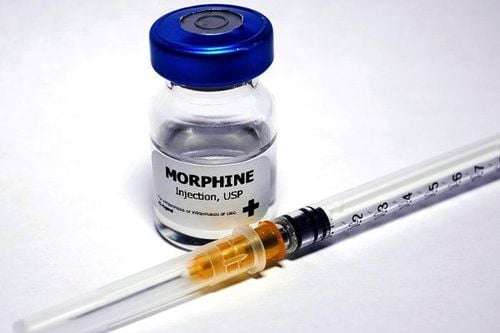This is an automatically translated article.
Cancer treatment with chemotherapy often brings many side effects, in which leukopenia is the most common complication. Leukopenia during chemotherapy on cancer patients can cause body aches, fatigue, high fever, even death if not treated promptly.
1. What is leukopenia during chemotherapy?
White blood cells have an important role in the body, especially in protecting the body against infections. However, for cancer patients with indications to use chemotherapy for treatment, in addition to killing cancer cells, it also destroys healthy cells, including bone marrow. When bone marrow cells are damaged and die, the ability to produce blood cells decreases, causing white blood cells in the body to decrease.
Leukopenia in cancer patients usually occurs about 7-12 days after chemotherapy. However, this time can vary depending on the chemotherapy factor that the cancer patient receives. Normally, leukopenia is divided into 4 grades:
Grade 1: Absolute neutrophil count from 1.5 - 2 g/l; Grade 2: Neutrophils from 1 - 1.5 g/l; Grade 3: Neutrophils decrease from 0.5 - 1 g/l; Grade 4: Neutrophils less than 0.5 g/l. Leukemia cancer is very dangerous, making the patient's resistance decline, so it can easily lead to infection and many other dangerous complications. At the same time, leukopenia is often silent, with no obvious signs until infection occurs. This makes the treatment more complicated and difficult.
2. Signs to recognize leukopenia in cancer patients
For neutropenic patients receiving chemotherapy, even the smallest infections can become serious and require immediate treatment. Some signs of leukopenia when receiving chemotherapy are easy to recognize such as:
High fever; Chills and sweating; Cough change or new cough; Sore throat or mouth pain; Shortness of breath; Stuffy nose; Pain when urinating; Vaginal discharge or unusual irritation; urinating a lot ; Redness, pain, or swelling in many areas; Diarrhea ; Vomit; Abdominal or rectal pain; New onset of pain.

Hạ bạch cầu ở người bệnh ung thư thường xảy ra vào khoảng 7-12 ngày sau khi tiến hành hóa trị liệu
3. Treatment of leukopenia during chemotherapy
Usually, when patients with leukaemic cancer in grade 1 and grade 2, the doctor will order to stop using chemotherapy to monitor the condition. In the case of patients with grade 3 and 4 leukaemic cancer, treatment must be carried out. Treatment methods include:
Use of antibiotics: When the patient has fever, neutropenia, chemotherapy must be discontinued and broad-spectrum antibiotic treatment. Based on the specific condition of the patient, the doctor will choose 1 or more suitable antibiotics. The duration of antibiotic use depends on whether the source of infection is identified, usually about 14 days. Using drugs to stimulate leukocyte proliferation: This method includes 2 levels of prevention as follows: Primary prevention: Patients with leukopenia with high risk of complications or patients with one of the following factors: such as: Over 65 years old, weak body, ever had fever, leukopenia, large doses of radiation or chemotherapy at the same time, decreased blood cells due to bone marrow invasion, poor nutrition, infected open wounds, cancer progression, with concomitant medical disease. Secondary prevention: The doctor will prescribe the use of drugs depending on the purpose of symptomatic or radical treatment. Transfusion of white blood cells: When the clinical condition is more severe and the use of leukocyte stimulating drugs is not effective, the doctor will prescribe a white blood cell transfusion. However, when using this method, attention should be paid to the possible anaphylactic reactions. In summary, leukopenia is one of the common complications in cancer treatment with chemotherapy. Currently, early cancer screening is considered the perfect measure in timely detection and treatment of cancers. Thereby reducing the risk of complications as well as reducing the cost of treatment and especially the mortality rate in patients. Vinmec International General Hospital always deploys and introduces to customers the Early Cancer Screening Package at Vinmec - Peace of mind to live well to help with gene testing, imaging, testing of biomarkers to detect tumors you early.
Choosing the Early Cancer Screening Package at Vinmec - Peace of mind at Vinmec, customers will get:
Only one gene test can assess the risk of 16 common cancers in both men and women ( Lung cancer, colorectal cancer, breast cancer, pancreatic cancer, cervical cancer, stomach cancer, prostate cancer, ....) Early detection of early signs of cancer cancer through imaging, endoscopy, and ultrasound. The operation is simple, careful and accurate. A team of well-trained specialists, especially in oncology, are capable of handling cancer cases. With facilities, advanced and modern medical equipment and a team of doctors with deep expertise and experience. At Vinmec, the examination process becomes quick with accurate results, saving costs and time for patients.
Please dial HOTLINE for more information or register for an appointment HERE. Download MyVinmec app to make appointments faster and to manage your bookings easily.













